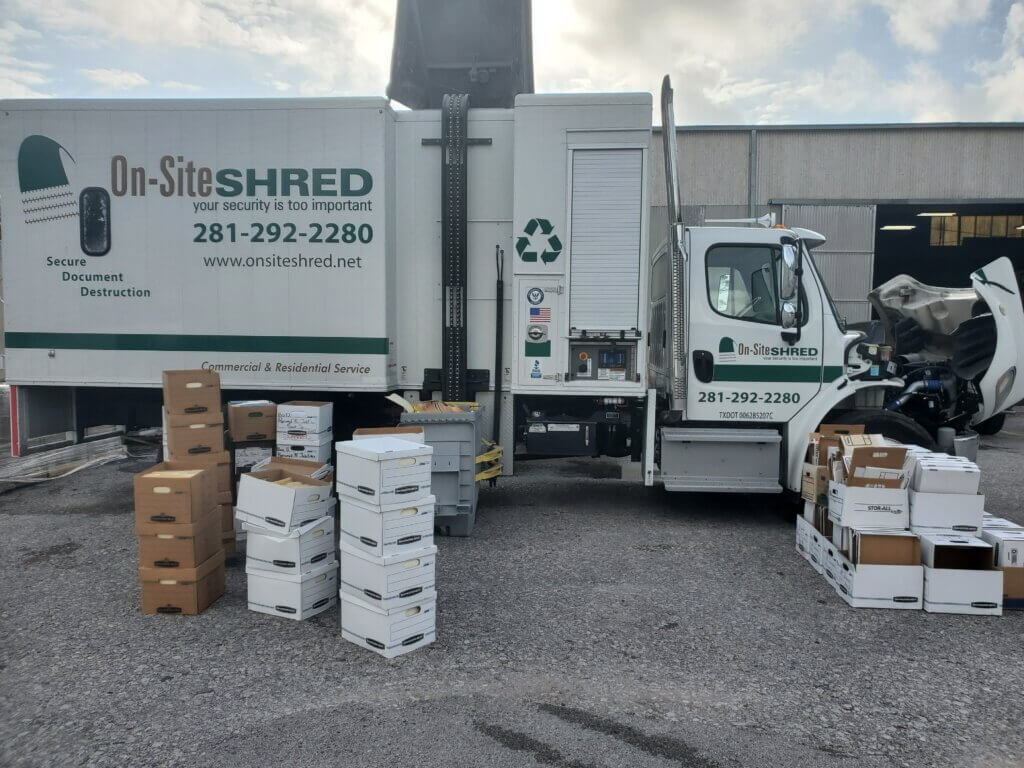Information That Requires Destruction Can Be Found At Every Place of Business
Benefits of document Shredding – It’s unfortunate but true: improperly discarded documents can ruin lives and destroy businesses. Identity theft is a fast-growing crime in the United States, and Houston ranks among the top cities in Texas for such incidents. Local news stories often highlight companies that improperly disposed of documents containing sensitive personal information, leaving them scrambling to explain their negligence on the evening news. While some claim that any publicity is good publicity, appearing before millions of Houstonians for failing to protect their personal information is a surefire way to damage, or even lose, your business.
The Texas Attorney General takes identity theft very seriously and is dedicated to protecting Texans. Hefty fines by the Attorney General’s office will be imposed on businesses for violating state laws governing the disposal of records containing personal information. The Texas Business and Commerce Code outlines strict requirements for document destruction and the penalties for noncompliance. Enforcement teams, including “dumpster divers,” actively search for violations, and documents are often discovered by local police or concerned citizens.
In addition to state laws, there are federal regulations for document destruction depending on your industry. Companies without a risk management officer should designate someone to oversee their document retention and destruction policies. It’s critical to note that a crime doesn’t need to occur for the Texas Attorney General to take action—the mere exposure of documents to potential identity theft risks is enough for prosecution.
Benefits of document shredding – One incident is all it takes to destroy years of hard work, tarnish a company’s reputation, and erode its standing in the community. Protecting sensitive information isn’t just a legal obligation—it’s essential to maintaining trust and safeguarding your business.
A Retention Schedule Should be in Place Governing the Length of Time Records Should be Kept.
Benefits of document Shredding – Depending on your business and industry you may be legally required to establish retention and disposal procedures. According to Texas Business and Commerce Code, businesses must implement document retention and disposal policies to safeguard their client’s personal and private information. These laws are designed with a clear purpose: to protect millions of Texans from becoming victims of identity theft.
Developing a retention schedule for business documents is a crucial step in ensuring compliance, efficiency, and security. A retention schedule outlines how long different types of
documents must be kept before they can be securely destroyed or archived. The process begins by identifying all categories of documents generated or received by the business, such as financial records, contracts, personnel files, and customer data. Each category should be evaluated to determine its value and relevance, considering legal requirements, operational needs, and historical significance. This initial assessment ensures no critical documents are overlooked and forms the foundation for an effective retention policy.
Once the categories are identified, the next step is to research and align the retention periods with applicable laws and regulations. Businesses must comply with federal, state, and industry- specific requirements that dictate how long certain documents must be retained. For example, tax records may need to be kept for at least seven years, while employee payroll records might require longer retention periods depending on labor laws. Collaborating with legal counsel or compliance experts can help ensure the schedule is accurate and up to date with regulatory changes. Additionally, businesses should balance legal compliance with operational efficiency,
retaining documents only as long as necessary to reduce storage costs and minimize data security risks.
Implementing the retention schedule requires clear communication and regular training for employees to ensure they understand the policies and their responsibilities. Digital tools and document management systems can streamline the process by automating retention periods and securely managing the destruction of documents once they reach the end of their lifecycle. Periodic reviews of the retention schedule are also essential to ensure it remains relevant and compliant with evolving legal and business requirements. A well-developed retention schedule not only protects the business from legal risks but also enhances efficiency, reduces clutter, and fosters better information governance. Benefits of document shredding are vast.
Type of document
Edit Table
Capital Stock
Edit Table
Contracts
Edit Table
Correspondence
Edit Table
Expense reports
Edit Table
Financial reports
Edit Table
Labor records
Edit Table
Ledgers and journals
Edit Table
Maintenance and repair records
Edit Table
Property records
Edit Table
Tax returns (copies)
Paper Shredding Saves Money
Outsourcing paper shredding can save businesses significant money by reducing operational costs associated with in-house paper shredding. Maintaining an internal shredding process requires investments in shredding equipment, regular maintenance, and supplies like bags or containers. Additionally, employees must spend time shredding documents, which takes them away from their core responsibilities. This loss of productivity can be costly, particularly for businesses with large volumes of documents to manage. By outsourcing to On-Site Shred’s professional document destruction service, companies eliminate the need for equipment and labor, allowing them to focus resources on revenue-generating activities.
On-Site Shred’s professional shredding service also help businesses avoid potential fines and legal expenses related to non-compliance with document disposal laws. Federal, state, and industry regulations often have strict requirements for the proper handling and destruction of sensitive information.
Failure to comply can result in hefty fines, lawsuits, or damage to a company’s reputation. On-Site Shred has been providing secure document destruction since 2007 and will help ensure compliance with all relevant laws, providing peace of mind and a legal audit trail through certificates of destruction. This level of assurance significantly reduces the financial risks associated with improper document disposal.
Another way outsourcing paper shredding saves money is by optimizing storage costs. Many businesses hold onto documents longer than necessary due to uncertainty about proper disposal procedures. Over time, this leads to increased expenses for physical or digital storage.
On-Site Shred’s professional shredding services can assist in creating a paper shredding schedule, ensuring documents are securely destroyed once they are no longer needed. This
prevents the unnecessary accumulation of records, reduces storage expenses, and mitigates security risks associated with retaining outdated or unnecessary documents. By streamlining paper shredding processes, businesses can operate more efficiently and cost-effectively.


